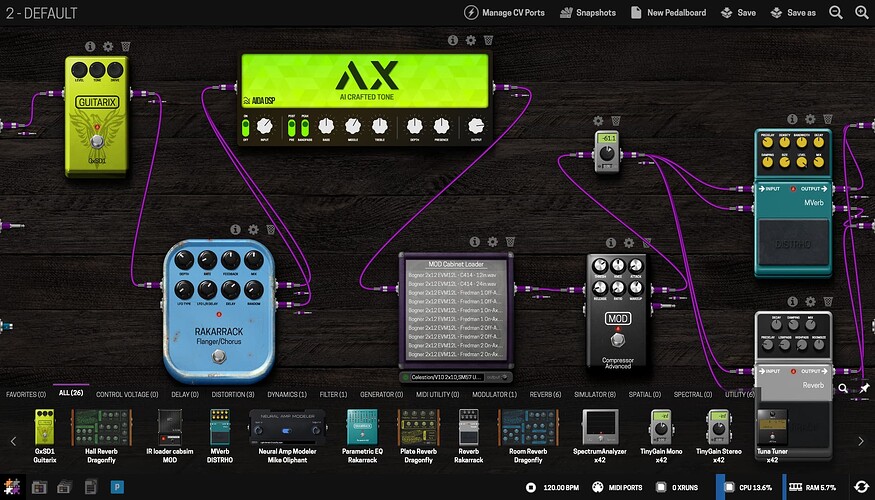rpi4b with 4gb ram, sandisk usb 3.2 boot drive. i will try booting from the micro sd
Maybe it should help. Seems it may freeze on boot due to the specific usb driver used in rt kernel.
Unfortunately not – kinda gave up on the Patchbox + PureData system and am just using vanilla Raspbian.
Has anyone tried running the appImage of Midihub Editor for Raspberry Pi on this build? I can’t get it to run. I went thru all the standard steps (i.e. download appImage, chmod +x, start from terminal) and it fails to open. Is this because the latest MidihubEditor.appImage is not built for 64-bit?
I’m mostly certain it’s related to this ARM64 build of PatchboxOS because I subsequently imaged a different SD card with the 32-bit build of Patchbox and the same version of the appImage ran as expected.
If it works on 32 bit os, it should not work on 64 bit os “from the box” (As i know).
For pi3 usb issues with RT kernel, you can try adding the following to your /boot/config.txt
dtoverlay=dwc2,dr_mode=host
That is my assumption as well. I guess I’m wondering if a 64-bit build of Midihub Editor for RasPi is in the works @Giedrius ?
The real-time kernel does work with Pi 4 and Pi 5, and probably Pi Zero 2W (we don’t have a Zero 2W, if someone could try that, let us know the outcome)
I tried to install the real time kernel on RPI Z2W. I tried to do this 3 times. All the time the installation process hangs on “update-initramfs: Generating /boot/initrd.img-6.6.20+rpt-rpi-rt-v7”. In this case, a file “initrd.img-6.6.20+rpt-rpi-rt-v7.new” with a size of 1,949,696 bytes is created, and everything freezes (rpi is disconnected from Wi-Fi, power consumption is maintained at the same level, although current consumption during normal operation changes).
I tried replacing the SD card, but it didn’t help.
Perhaps there are other ways to install the real-time kernel on RPI Z2W, not through patchbox->kernel?
The output of the installation process from the console via ssh is attached in the file.
ssh.txt (9.1 KB)
So… Output from the console (via ssh) of my Pi Zero 2W:
patch@patchbox:~ $ uname -srm
Linux 6.6.20+rpt-rpi-rt-v8 aarch64
Installed all packages manually. I suffered for a long time, as I sometimes had to reboot due to freezes. After rebooting, everything was restored using the command “dpkg --configure -a”.
But the Pi won’t boot with a USB sound card connected. When connecting a sound card after booting, the system freezes.
I’m ready to provide logs if needed.
I’ll try connecting another sound card, maybe that will help. I also plan to try PCM-5102.
You’ll need to increase the swap on zero2w if building from scratch. It freezes because it’s running out of memory and swap should fix that. It is quite a long shot to use a usb audio card. 1ghz quad is a tad under powered for that, but you should have luck using an i2s based card
Thanks for the advice. I hoped and believed))) I will try PCM-5102.
By the way, the second sound card also causes the system with a real-time kernel to freeze.
Increasing the swap size to 1024 Mb solves the problem with installing the real-time kernel on the Pi Zero 2W.
But why does the Pi stop booting with a sound card connected via USB (everything works with the standard kernel)? Maybe the same problem as on Pi 3?
Try this, same applies as the base architecture of zero 2 and pi 3 are the same
I have ‘cloned’ your pedalboard and added some extra pedals. CPU is only at 14% max. I have a pi5 and now running jackd at 96kHz, 128 frames, 2 periods. I started from scratch. In the recent past I tried copying stuff but got erratic behaviour when copying pedal boards (and maybe some other stuff, but I don’t remember exactly.
@mischa thanks for the tip. I do need to get back to testing out the 64-bit build but I’ve been so busy with an ERP conversion at work I just haven’t had time. We’re almost there so I hope to get back to this soon.
@jtemple967 Important things first! Even tested the setup with just 64 frames and 2 periods. Still only at 16-17% CPU.
It did not help. The OS loading still stops somewhere when a USB device is connected. When connecting USB devices after loading the OS, it does not immediately lead to a freeze. But in the end, at some point everything freezes.
In general, I’m giving up on trying to run this OS on pi zero 2w.
By the way, the PCM5102A started up, if anyone is interested in running the system without incoming audio streams and a USB connection.
@Giedrius I wanted to follow up on this topic. I finally got a Pi5 and tried PiSound with the exact same SD card that was generating high CPU usage on my Pi4. No issues, no high CPU usage whatsoever.
I missed this post in April but made a fresh distribution on my Rpi5 with pisound (2020) yesterday - overall smooth, but some issues with incompatible libraries, e.g.
- Most of the MODEP pedals work, but the FluidSynth ones are complaining about incompatible libraries
Jul 02 16:54:17 patchbox mod-host[867]: lilv_lib_open(): error: Failed to open library /var/modep/lv2/FluidGuitars.lv2/FluidPlug.so (/var/modep/lv2/FluidGuitars.lv2/FluidPlug.so: ELF load command address/offset not page-aligned)
- Midihub editor won’t load, similarly because the included “libcrypto.so.3” also seems to be built with the wrong architecture.
/tmp/.mount_MidihuJbKmml/usr/bin/midihub-editor: error while loading shared libraries: libcrypto.so.1.1: ELF load command address/offset not page-aligned
Could you let us know where did you get thet FluidSynth plugin from? Maybe it was built wrong.
That’s because the build was for armv7. I’ve just published aarch64 build, please give it a try here: [Download] Midihub Editor 1.15.3 & Firmware 1.15.1
And let me know whether it works for you.
